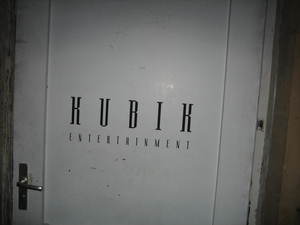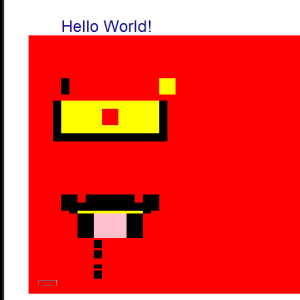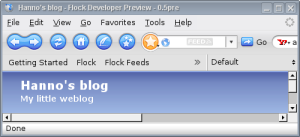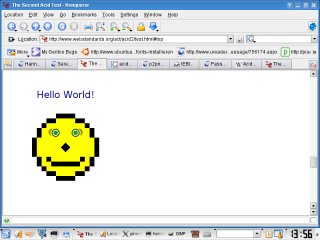Tuesday, August 29. 2006
Webmontag der Dritte, Vortrag »Zentrale vs. dezentrale Webservices«
Heute (naja, gestern) wieder Webmontag in Karlsruhe im Kubik. Es gab drei Vorträge, einer davon von mir (ich hab das Gefühl, dass meine Vortragsroutine langsam besser wird), Slides wie immer als OpenDocument und als PDF. Die Leute waren heute sehr diskutierfreudig, weswegen es deutlich länger als geplant ging. Zwar musste natürlich irgendwann der Einwand »Businessmodel« kommen (ich glaub da schreib ich mal was längeres zu), aber insgesamt war's ganz in Ordnung.
Anschließend MNT über Simple Sharing Extensions, scheint ne interessante Sache zu sein, die evtl. einige der Probleme lösen könnte, über die ich mir auch schon Gedanken gemacht hab (wie verknüpf ich indizierte RSS-Elemente wieder mit ihrem Ursprung). Achja: Es ist zwar von Microsoft, aber die Dokumente als CC veröffentlicht.
Problem scheint im Moment zu sein, dass es keine Software dafür gibt.
Dritter und letzter Oliver Gassner, der sich am Begriff (oder, wie er meinte, nicht-Begriff) Web 2.0 störte, weil dieser völlig undefinierbar und unbrauchbar sei. Ich würde jetzt mal wagen, dem vorsichtig zu widersprechen, dass man schon grob einkreisen kann, worum es sich bei Web 2.0 dreht: Im weitesten Sinne offene Kommunikation mit Interaktionsmöglichkeiten, die die Möglichkeit zum reinen Lesen/Konsumieren bietet, aber dem Nutzer auf Wunsch irgendeine Art von Interaktion ermöglicht. Zwar hat Oliver einige Dinge mehr noch erwähnt, die angeblich Web 2.0 seien (Pay per click, kontextsensitive Werbung) und damit nix zu tun haben, ich fand aber unklar, wieso er die jetzt zu Web 2.0 mitzählen will. Alles, was ich allgemein drunter verstehen würde, hat schon dieses Interaktionsmerkmal zu eigen.
Im Anschluss beim Socialing hatten wir noch ne kleine Runde über CAcert (nächstes Mal gibt's glaub von mir dazu n ausführlichen Vortrag, scheint ja doch großes Interesse zu wecken) und eine etwas hitzigere Diskussion über Linux auf dem Desktop. Dabei hab ich gemerkt, dass ich mir in jüngerer Zeit angewöhnt hab, auch die Linux 9.0-Fraktion freundlich zu behandeln.
Anschließend MNT über Simple Sharing Extensions, scheint ne interessante Sache zu sein, die evtl. einige der Probleme lösen könnte, über die ich mir auch schon Gedanken gemacht hab (wie verknüpf ich indizierte RSS-Elemente wieder mit ihrem Ursprung). Achja: Es ist zwar von Microsoft, aber die Dokumente als CC veröffentlicht.
Problem scheint im Moment zu sein, dass es keine Software dafür gibt.
Dritter und letzter Oliver Gassner, der sich am Begriff (oder, wie er meinte, nicht-Begriff) Web 2.0 störte, weil dieser völlig undefinierbar und unbrauchbar sei. Ich würde jetzt mal wagen, dem vorsichtig zu widersprechen, dass man schon grob einkreisen kann, worum es sich bei Web 2.0 dreht: Im weitesten Sinne offene Kommunikation mit Interaktionsmöglichkeiten, die die Möglichkeit zum reinen Lesen/Konsumieren bietet, aber dem Nutzer auf Wunsch irgendeine Art von Interaktion ermöglicht. Zwar hat Oliver einige Dinge mehr noch erwähnt, die angeblich Web 2.0 seien (Pay per click, kontextsensitive Werbung) und damit nix zu tun haben, ich fand aber unklar, wieso er die jetzt zu Web 2.0 mitzählen will. Alles, was ich allgemein drunter verstehen würde, hat schon dieses Interaktionsmerkmal zu eigen.
Im Anschluss beim Socialing hatten wir noch ne kleine Runde über CAcert (nächstes Mal gibt's glaub von mir dazu n ausführlichen Vortrag, scheint ja doch großes Interesse zu wecken) und eine etwas hitzigere Diskussion über Linux auf dem Desktop. Dabei hab ich gemerkt, dass ich mir in jüngerer Zeit angewöhnt hab, auch die Linux 9.0-Fraktion freundlich zu behandeln.
Posted by Hanno Böck
in Code, Computer culture, Linux, Webdesign
at
00:55
| Comments (4)
| Trackbacks (0)
Friday, July 28. 2006
Hackergotchi
 Thanks to yetzt, I finally have a hackergotchi for various planets. If you are publishing the content of this blog in some planet, feel free to add it.
Thanks to yetzt, I finally have a hackergotchi for various planets. If you are publishing the content of this blog in some planet, feel free to add it.
Posted by Hanno Böck
in Computer culture, English, Life, Webdesign
at
22:07
| Comments (0)
| Trackbacks (0)
Tuesday, July 4. 2006
Montag und Web zum Zweiten
 Um circa halb zehn fiel es mir heute ein: Da war doch noch was Montag abend. Viel zu spät trudelte ich also beim zweiten Karlsruher Webmontag ein. Vorträge waren natürlich sämtliche schon vorbei, dafür aber noch einiges an interessantem Socialing.
Um circa halb zehn fiel es mir heute ein: Da war doch noch was Montag abend. Viel zu spät trudelte ich also beim zweiten Karlsruher Webmontag ein. Vorträge waren natürlich sämtliche schon vorbei, dafür aber noch einiges an interessantem Socialing.Der Webmontag fand diesmal im Kubik statt, ein von einem Verein betriebenes Cafe. Sowohl was Atmosphäre, als auch Preise und technische Ausstattung anging deutlich angenehmer als das Mal zuvor, insofern meine Stimme für zukünfige Webmontage im Kubik.
Thursday, June 15. 2006
Planet Karlsruhe
Seit einigen Tagen am Start: Planet Karlsruhe, was ausgebaut werden soll zu einer möglichst vollständigen Sammlung Karlsruher Blogs.
Die bisher eingetragenen haben sich entweder bei mir gemeldet oder ihr Blog steht unter Creative Commons. Frei lizensierte Blogs trage ich ungefragt ein, alle anderen mögen mir bitte per Mail mitteilen, wenn sie aufgenommen werden möchten.
Die bisher eingetragenen haben sich entweder bei mir gemeldet oder ihr Blog steht unter Creative Commons. Frei lizensierte Blogs trage ich ungefragt ein, alle anderen mögen mir bitte per Mail mitteilen, wenn sie aufgenommen werden möchten.
Thursday, June 1. 2006
Short tip: License-data with planet
planet is a famous python software to combine the feeds of various blogs (or other feed-sources) to one website. It's used by various free software projects, organizations etc.
While thinking about creating a planet karlsruhe, I thought about possible licensing/copyright problems, in theory you would have to ask everyone you aggregate. As there are many blogs using free or semi-free licenses like FDL or Creative Commons that at least allow re-distributing unchanged content if you stick with the license, adding license-data would make it perfectly legal to add those feeds without asking.
planet is already flexible enough to do this, as you can just add additional variables. Change the config.ini to something like this:
[https://blog.hboeck.de/feeds/atom.xml]
name = Hanno Böck
license_name = Creative Commons by-sa
license_link = http://creativecommons.org/licenses/by-sa/2.5/
Add some Code to the template:
<TMPL_IF channel_license_name>
<TMPL_IF channel_license_link><a href="<TMPL_VAR channel_license_link ESCAPE="HTML">"></TMPL_IF>
<TMPL_VAR channel_license_name ESCAPE="HTML">
<TMPL_IF channel_license_link></a></TMPL_IF>
</TMPL_IF>
And you're done.
While thinking about creating a planet karlsruhe, I thought about possible licensing/copyright problems, in theory you would have to ask everyone you aggregate. As there are many blogs using free or semi-free licenses like FDL or Creative Commons that at least allow re-distributing unchanged content if you stick with the license, adding license-data would make it perfectly legal to add those feeds without asking.
planet is already flexible enough to do this, as you can just add additional variables. Change the config.ini to something like this:
[https://blog.hboeck.de/feeds/atom.xml]
name = Hanno Böck
license_name = Creative Commons by-sa
license_link = http://creativecommons.org/licenses/by-sa/2.5/
Add some Code to the template:
<TMPL_IF channel_license_name>
<TMPL_IF channel_license_link><a href="<TMPL_VAR channel_license_link ESCAPE="HTML">"></TMPL_IF>
<TMPL_VAR channel_license_name ESCAPE="HTML">
<TMPL_IF channel_license_link></a></TMPL_IF>
</TMPL_IF>
And you're done.
Posted by Hanno Böck
in Code, Computer culture, Copyright, English, Webdesign
at
17:52
| Comment (1)
| Trackbacks (0)
Tuesday, May 30. 2006
Webmontag Karlsruhe und Planet KA
Seit gestern hat auch Karlsruhe einen Webmontag, welcher im Restaurant Stadtmitte stattfand, welches von unserer Anwesenheit aufgrund wohl mangelhafter Absprachen unter den Mitarbeitern etwas überrascht war.
Lediglich vier Kurzvorträge wurden aufgeboten, davon einer von mir selbst mit einigen Gedanken zu SSL und Webanwendungen (Slides hier). Das könnte hoffentlich nächstes Mal etwas mehr werden.
Mein eigener Vortrag löste vor allem Rückfragen bzgl. CAcert aus, es würde sich als anbieten, den nächsten Webmontag mit CAcert-Punkteverteilung zu verbinden.
Angesichts des doch recht großen Interesses und der offensichtlich ziemlich hohen Blogger-Dichte in Karlsruhe würde ich mal anregen, einen Planet Karlsruhe einzurichten. Die von Lars betriebene Plattform planetplanet.de würde sich hierzu anbieten, ich werde das mal in die Wege leiten.
Um der Formalia zwecks Urheberrechten gerecht zu werden, bitte ich alle Karlsruher Blogger, die damit einverstanden sind, auf einem Planet indiziert zu werden, mich samt URL + Feed-URL zu kontakten.
Update: Nächster Webmontag bereits in Planung für den 3. Juli.
Lediglich vier Kurzvorträge wurden aufgeboten, davon einer von mir selbst mit einigen Gedanken zu SSL und Webanwendungen (Slides hier). Das könnte hoffentlich nächstes Mal etwas mehr werden.
Mein eigener Vortrag löste vor allem Rückfragen bzgl. CAcert aus, es würde sich als anbieten, den nächsten Webmontag mit CAcert-Punkteverteilung zu verbinden.
Angesichts des doch recht großen Interesses und der offensichtlich ziemlich hohen Blogger-Dichte in Karlsruhe würde ich mal anregen, einen Planet Karlsruhe einzurichten. Die von Lars betriebene Plattform planetplanet.de würde sich hierzu anbieten, ich werde das mal in die Wege leiten.
Um der Formalia zwecks Urheberrechten gerecht zu werden, bitte ich alle Karlsruher Blogger, die damit einverstanden sind, auf einem Planet indiziert zu werden, mich samt URL + Feed-URL zu kontakten.
Update: Nächster Webmontag bereits in Planung für den 3. Juli.
Wednesday, May 24. 2006
New stuff in this blog
I usually don't like to do too much blogging about my blog, but I recently installed two new features I find worth mentioning.
One is that I have installed the serendipity calendar plugin, which you can see on the right (if you aren't reading rss). It'll contain events I find interesting/worth mentioning and will probably visit and maybe write reports about. It's a bit limited, it doesn't support more detailed time information (events longer than a day, time etc.), it shows the days till the event, but not for the first one, which I don't understand yet why. Maybe I'll hack a bit on it.
The other thing is that this blog is now available on IPv6 and there also with a correct, CAcert-signed ssl-certificate. So you can now read my blog secure ;-)
CAcert is a noncommercial certification authority based on a web-of-trust mechanism and I suggest you install their root-cert in your browser.
One is that I have installed the serendipity calendar plugin, which you can see on the right (if you aren't reading rss). It'll contain events I find interesting/worth mentioning and will probably visit and maybe write reports about. It's a bit limited, it doesn't support more detailed time information (events longer than a day, time etc.), it shows the days till the event, but not for the first one, which I don't understand yet why. Maybe I'll hack a bit on it.
The other thing is that this blog is now available on IPv6 and there also with a correct, CAcert-signed ssl-certificate. So you can now read my blog secure ;-)
CAcert is a noncommercial certification authority based on a web-of-trust mechanism and I suggest you install their root-cert in your browser.
Friday, February 3. 2006
Internet Explorer 7 and CSS - at least a bit better

Acid2 in IE7
As I've been interested in webdesign for quite a long time, I was often worried that you couldn't use a bunch of possibilities in modern HTML code, because the nearly monopoly browser doesn't support them. Microsoft has not done any development on the IE for several years. When Firefox started to endanger the market share of the IE, they decided to change their mind.
Now I had the chance to have a first look at the IE7 on a friends laptop. I won't comment on the interface improvements, cause I wouldn't seriously suggest anyone to use this browser. I'm only interested from a webdesigners perspective, because I know that despite of all the buzz about Firefox, still a lot of people use the »default« on their system without thinking about it and probably will continue to do so.
I held a bunch of html/css test-cases for a while with examples I faced due to my webdesign work and found out that they don't work in some browsers.
A quick note: IE7 will behave completely as crappy as before if your docs have a HTML 4 doctype declaration. So to check the new css features, define XHTML 1.1 in your doctype and IE7 will use a »strict-mode« to render your pages.
The features I was missing most in the past are finally implemented: Transparent PNGs, fixed-positioned objects and defining objects through their left and right distance.
Beside that, there are still a bunch of features missing, min-height, max-height, empty-cells, just to name some. In my test-cases, it couldn't compete with any other browser, although they may be not representative. If you have suggestions for enhancements to the test-cases, feel free to mail me or post them.
My blog looks quite okay, some minor bug with the top black line, maybe I'll investigate this further (well, maybe not, maybe you just shouldn't use IE to watch this page ;-) ). Acid2 looks crappy as before.
So as a conclusion, IE7 has fixed the most grave issues, but is far away from fully implementing CSS2. If the free browsers want to enlarge their ledge over IE, I'm still waiting for the first browser to call CSS2-complete.
I hope this can be a chance to come a step forward in webdesign. For the future, the CSS3 previews looks very promising, I hope it won't take as many years as CSS2 till browser developers will take care about it.
Friday, January 27. 2006
Web 0.1 - Channel 4, IT Crowd
Channel 4, a UK television channel, has a new series called IT Crowd. As they are very modern and as the series is about an IT company, they may have thought:
»We've heard of this bleeding-edge thing called internet. Maybe we should do something about that.«
And here is what they did: They provided an obscure mix of javascript and flash to play an embedded wmv-file (which doesn't work in my konqueror, although I have the appropriate plugins installed). Julian wrote about it and was able to extract the download URL. WMV9, so no chance without win32codecs atm.
More and more tv stations provide some stuff online and this is really fine. It could be more, it could be better quality, there should be more free licensed stuff etc., but still, it's a step in the right direction. But hey, providing proprietary file formats embedded in proprietary is not how the web should look like in 2006. RSS-Feeds are made for stuff like that. Why can't they just use them? We have a bunch of formats that can at least be played on nearly every platform (and, not to forget that I'd always prefer an mpeg/patent-free format like ogg theora).
Sidenote: Recently I wrote to the german tv magazine Monitor, that provides it's files as real-streams, why they couldn't provide RSS with other formats. Their answer was that it's due to copyright reasons so people cannot download the files ...
... with their Internet Explorer. If you come over an rtsp/mms/whatever-stream and want to download it, mplayer is your friend. mplayer -dumpstream [url] fetched every stream I ever wanted to download.
»We've heard of this bleeding-edge thing called internet. Maybe we should do something about that.«
And here is what they did: They provided an obscure mix of javascript and flash to play an embedded wmv-file (which doesn't work in my konqueror, although I have the appropriate plugins installed). Julian wrote about it and was able to extract the download URL. WMV9, so no chance without win32codecs atm.
More and more tv stations provide some stuff online and this is really fine. It could be more, it could be better quality, there should be more free licensed stuff etc., but still, it's a step in the right direction. But hey, providing proprietary file formats embedded in proprietary is not how the web should look like in 2006. RSS-Feeds are made for stuff like that. Why can't they just use them? We have a bunch of formats that can at least be played on nearly every platform (and, not to forget that I'd always prefer an mpeg/patent-free format like ogg theora).
Sidenote: Recently I wrote to the german tv magazine Monitor, that provides it's files as real-streams, why they couldn't provide RSS with other formats. Their answer was that it's due to copyright reasons so people cannot download the files ...
... with their Internet Explorer. If you come over an rtsp/mms/whatever-stream and want to download it, mplayer is your friend. mplayer -dumpstream [url] fetched every stream I ever wanted to download.
Posted by Hanno Böck
in Copyright, English, Linux, Movies, Webdesign
at
22:45
| Comments (2)
| Trackbacks (0)
Wednesday, January 18. 2006
Firefox implementing spy-feature
As reported on several news-pages, Firefox is going to implement a »ping« that implements a new »feature« to the link-tag to send a ping out to some URL defined. This has a very bad taste to me.
What I always liked in the free software world was that not every app is sending »something« to »someone« in the net, as it's quite common in Windows apps. I remember on the last days I were using Windows (98) on a regular basis, I had some of those »personal firewalls« installed. Apps that had absolutely nothing to do with the net wanted to connect to their home-server, apps where I've selected »no internet connection« still tried to do »something« online (the last one for example was winamp).
Now, I know that the design of the world wide web is really privacy-unfriendly. Yes, you can filter out a lot of things with stuff like privoxy, but in the end, you have the only possibility to disable everything (javascript, image loading from foreign servers, cookies) and lose the possibility to use a bunch of web-services. The browser can't do much about this, as this is how the web is designed.
But still, I think this firefox »feature« is a big mistake. Especially free software applications should be much more precautious about their users privacy. I can't see a big use of it for the user. But I can think of a bunch of possibilities to misuse it.
We are always crying about the »evil ones«, the spyware-producers out there, just remember the recent buzz about the iTunes-spyware-functionality. That's perfectly right. But in the end, we need to do better in free software to provide an alternative. I hope that the firefox developers re-think about this and remove or at least disable-by-default these website-pings before their next release.
What I always liked in the free software world was that not every app is sending »something« to »someone« in the net, as it's quite common in Windows apps. I remember on the last days I were using Windows (98) on a regular basis, I had some of those »personal firewalls« installed. Apps that had absolutely nothing to do with the net wanted to connect to their home-server, apps where I've selected »no internet connection« still tried to do »something« online (the last one for example was winamp).
Now, I know that the design of the world wide web is really privacy-unfriendly. Yes, you can filter out a lot of things with stuff like privoxy, but in the end, you have the only possibility to disable everything (javascript, image loading from foreign servers, cookies) and lose the possibility to use a bunch of web-services. The browser can't do much about this, as this is how the web is designed.
But still, I think this firefox »feature« is a big mistake. Especially free software applications should be much more precautious about their users privacy. I can't see a big use of it for the user. But I can think of a bunch of possibilities to misuse it.
We are always crying about the »evil ones«, the spyware-producers out there, just remember the recent buzz about the iTunes-spyware-functionality. That's perfectly right. But in the end, we need to do better in free software to provide an alternative. I hope that the firefox developers re-think about this and remove or at least disable-by-default these website-pings before their next release.
Tuesday, November 1. 2005
Finally: A new design
After blogging for more than a year with the default design of my blog software (at first bblog, now serendipity), I finally managed to create my own design. So if you are reading this in a RSS-reader, on some planet or some other place, today it's worth watching my page live in a real web browser.
As you may expect, the layout is 100% valid XHTML 1.1 and CSS 2. It works fine in all common browsers known to have basic support for CSS (tested in Konqueror, Mozilla Firefox and Opera). It's a well known fact that the so-called browser from Microsoft, the Internet Explorer, fails to support modern web standards, so it'll look ugly. For IE-visitors, I implemented a browser-check and they'll get a note. I've tried to create the check in a way that won't hurt browsers with user agent forging. If you see this message and aren't using the IE, I'd like to hear from you.
I don't know how this layout performs in the Internet Explorer 7 beta versions, as Microsoft doesn't provide them to the public. If you have access to those betas, I'd also like to hear about it.
For the technical side: The html is created with various text-editors, with the smarty template system used by serendipity. The graphics were edited with the great GIMP, using latest technology like the SIOX-algorithm, the sign was created with a wacom graphire graphics tablet, also in GIMP.
As you may expect, the layout is 100% valid XHTML 1.1 and CSS 2. It works fine in all common browsers known to have basic support for CSS (tested in Konqueror, Mozilla Firefox and Opera). It's a well known fact that the so-called browser from Microsoft, the Internet Explorer, fails to support modern web standards, so it'll look ugly. For IE-visitors, I implemented a browser-check and they'll get a note. I've tried to create the check in a way that won't hurt browsers with user agent forging. If you see this message and aren't using the IE, I'd like to hear from you.
I don't know how this layout performs in the Internet Explorer 7 beta versions, as Microsoft doesn't provide them to the public. If you have access to those betas, I'd also like to hear about it.
For the technical side: The html is created with various text-editors, with the smarty template system used by serendipity. The graphics were edited with the great GIMP, using latest technology like the SIOX-algorithm, the sign was created with a wacom graphire graphics tablet, also in GIMP.
Friday, October 21. 2005
Flock: Browser for all the fancy new web stuff out there
 Everybody seems to talk about flock today (via BoingBoing). Flock is a web browser based on Firefox supporting features like direct tagging of links, uploading them to del.icio.us, blogging, uploading images to flickr and things like that.
Everybody seems to talk about flock today (via BoingBoing). Flock is a web browser based on Firefox supporting features like direct tagging of links, uploading them to del.icio.us, blogging, uploading images to flickr and things like that.It's surely a nice idea to integrate all those social software into easy to use applications, so more people get to know blogs and all that stuff. Although I'm a bit sceptically about centralised services like flick or del.icio.us, I prefere more standardised, decentralized services that everyone can use with his own software (Blogs, Podcasts and things like that).
I'd prefer to blog this entry with flock, but it seems not to support serendipity yet, at least I couldn't get it to work.
Get Flock today, probably no distribution packages for anything yet, but the binary just works when running from it's unpacked dir without installing anything.
Posted by Hanno Böck
in Computer culture, English, Gentoo, Linux, Webdesign
at
23:52
| Comments (0)
| Trackbacks (0)
Tuesday, September 20. 2005
Musikmagazin Echoes startet mit neuem Design und als Blog
Das von meinem Mitbewohner Julian mitbetriebene Online-Musikmagazin Echoes ist seit einigen Tagen mit neuem Design online und außerdem jetzt als Blog (Serendipity).
Die technische Umsetzung des Designs in HTML, CSS & Smarty ist mein Werk.
Die technische Umsetzung des Designs in HTML, CSS & Smarty ist mein Werk.
Tuesday, September 13. 2005
KDE 3.5, acid2, pmount
 After commiting a compile-fix for kmail, I finally managed to switch to KDE 3.5 Alpha. As you can see on the right, Konqueror now passes the acid2 browser test for standards compatibility (beside Safari it's the only Browser that does - Internet Explorer, Firefox and Opera all fail, Microsoft already announced that even IE7 won't be able to pass acid2 - I wonder what the IE-devs are doing all day).
After commiting a compile-fix for kmail, I finally managed to switch to KDE 3.5 Alpha. As you can see on the right, Konqueror now passes the acid2 browser test for standards compatibility (beside Safari it's the only Browser that does - Internet Explorer, Firefox and Opera all fail, Microsoft already announced that even IE7 won't be able to pass acid2 - I wonder what the IE-devs are doing all day).Probably more interesting for reality usage is that kde 3.5 finally supports automounting based on pmount with the new hal/dbus-API. I also happily noticed they fixed an annoying bug in konquerors ssl-handling when trying to permanently accept certificates that were issued for wrong hostnames.
Gentoo users can try it out by copying the kde 3.5 section from the package.mask-file to /etc/portage/package.unmask.
Wednesday, June 15. 2005
All browsers are crap
Today, several news-pages reported about a new working draft of the CSS 2.1 specification. CSS 2.1 removes some features from CSS 2.0.
One example is text-shadow, which is really a nice thing. If your browser supports it, you can see it here.
Why did they remove it? Because none of the mainstream browsers supports it. The one and only exception is Konqueror (and Safari, which is a fork of Konqueror). This feature may come back in CSS 3, which won't be released until the cows come home. This is imho really a bad decicion, it shows how browser vendors stop innovation in the world wide web. CSS 2.0 was released 1998, seven years ago and just NO SINGLE BROWSER implements it completely. If you don't believe me, just check text-shadow and empty-cells in all browsers available.
Because of the lack of modern standards, crappy, proprietary alternatives like Flash evolve. There are alternatives. SVG? Not really used at all. Do you know VRML and X3D? Really nice things. Do you know how many browsers support it out of the box? Not a single one.
It's really a pity that in these days, nice web-standards are available, but you can't use them. No doubt that the Internet Explorer is the main problem here. But Mozilla isn't much better. While Firefox brings a lot of innovation in user interfaces, the development of the gecko-engine lacks a lot of things. The only innovative force on the browser market at the moment is konqueror (which is probably the project with the smallest number of developers).
One example is text-shadow, which is really a nice thing. If your browser supports it, you can see it here.
Why did they remove it? Because none of the mainstream browsers supports it. The one and only exception is Konqueror (and Safari, which is a fork of Konqueror). This feature may come back in CSS 3, which won't be released until the cows come home. This is imho really a bad decicion, it shows how browser vendors stop innovation in the world wide web. CSS 2.0 was released 1998, seven years ago and just NO SINGLE BROWSER implements it completely. If you don't believe me, just check text-shadow and empty-cells in all browsers available.
Because of the lack of modern standards, crappy, proprietary alternatives like Flash evolve. There are alternatives. SVG? Not really used at all. Do you know VRML and X3D? Really nice things. Do you know how many browsers support it out of the box? Not a single one.
It's really a pity that in these days, nice web-standards are available, but you can't use them. No doubt that the Internet Explorer is the main problem here. But Mozilla isn't much better. While Firefox brings a lot of innovation in user interfaces, the development of the gecko-engine lacks a lot of things. The only innovative force on the browser market at the moment is konqueror (which is probably the project with the smallest number of developers).
« previous page
(Page 3 of 4, totaling 52 entries)
» next page